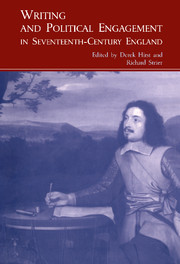Book contents
- Frontmatter
- Contents
- Notes on contributors
- Dedication
- Introduction
- 1 “I am Power”: normal and magical politics in The Tempest
- 2 “Void of storie”: the struggle for insincerity in Herbert's prose and poetry
- 3 Sir Kenelm Digby's rewritings of his life
- 4 Thomas Hobbes and the Renaissance studia humanitatis
- 5 Casuistry and allegiance in the English Civil War
- 6 Thomas May and the narrative of civil war
- 7 Samuel Parker, Andrew Marvell, and political culture, 1667–73
- 8 Sidney's Discourses on political imagoes and royalist iconography
- Notes
- Index
6 - Thomas May and the narrative of civil war
Published online by Cambridge University Press: 09 September 2009
- Frontmatter
- Contents
- Notes on contributors
- Dedication
- Introduction
- 1 “I am Power”: normal and magical politics in The Tempest
- 2 “Void of storie”: the struggle for insincerity in Herbert's prose and poetry
- 3 Sir Kenelm Digby's rewritings of his life
- 4 Thomas Hobbes and the Renaissance studia humanitatis
- 5 Casuistry and allegiance in the English Civil War
- 6 Thomas May and the narrative of civil war
- 7 Samuel Parker, Andrew Marvell, and political culture, 1667–73
- 8 Sidney's Discourses on political imagoes and royalist iconography
- Notes
- Index
Summary
Poet and historian, Thomas May was born in Sussex in 1595 and died in London – under circumstances much derided – in November 1650. Beginning with the contemporary satire Tom May's Death, attributed to Andrew Marvell, a special degree of venom was displayed towards him, and the story grew up that he had hoped for the laureateship on Ben Jonson's death in 1637, and had turned parliamentarian, and historian, out of disappointment when the bays went to William Davenant instead. To much later times there has persisted a tradition of dismissing his History as mere hack work, propaganda written to the specifications of his employers, and it can still be said that May as a literary and historiographical figure has received little serious study.
This chapter will attempt to remedy this neglect. The more one knows of the Civil War parliament, the more one doubts whether it knew its own mind well enough to instruct a mouthpiece; the well-worn adage that history is written by the winners depends on the assumption that the latter know what they have won and why they wanted to win it, and of few can this be said with less conviction than of the apparent victors in the English Civil Wars. Whatever May's motives or the sources of his income, it is possible that he found himself uninstructed and even perplexed as to the history he was expected to write.
- Type
- Chapter
- Information
- Writing and Political Engagement in Seventeenth-Century England , pp. 112 - 144Publisher: Cambridge University PressPrint publication year: 2000



